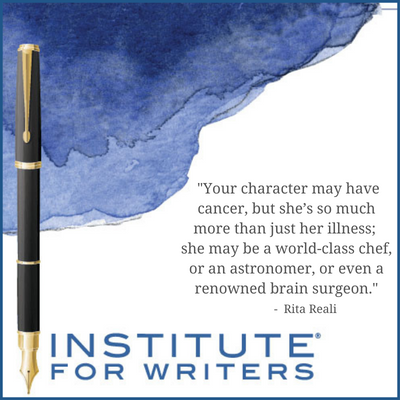1000 N. West Street #1200, Wilmington, DE 19801
© 2024 Direct Learning Systems, Inc. All rights reserved.

As we’ve seen over the past two weeks, developing characters is no simple feat. It takes time and plenty of thought and engagement with them. But when you’re writing a novel with a character with a serious (even terminal) illness, things can get touchy. While you don’t want to gloss over the ailment, you also don’t want it to be the sole focal point for the character’s entire being.
In other words, your character may have cancer, but she’s so much more than just her illness; she may be a world-class chef, or an astronomer, or even a renowned brain surgeon. But so often writers imbue their ailing characters with a disease to such an extent that they seem like merely an embodiment of the illness. And that’s just not right. It makes for uninteresting two-dimensional characters. (Insert yawn here.)
Today we’re going to take a look at how to write an ill character without reducing that person to little more than a shell—or, worse, a mere caricature of the illness.
 A common mistake many otherwise-credible authors make when attempting to write a character with an illness is painting that character with symptoms of the illness while neglecting to realize said individual has a full and rich life. Perhaps she’s a mother, a teacher, a gifted musician, a lover of poetry, even an amateur flower arranger—maybe even all of these things. So by the time the author is finished writing, all the reader sees is cancer, or lupus, or multiple sclerosis, or AIDS.
A common mistake many otherwise-credible authors make when attempting to write a character with an illness is painting that character with symptoms of the illness while neglecting to realize said individual has a full and rich life. Perhaps she’s a mother, a teacher, a gifted musician, a lover of poetry, even an amateur flower arranger—maybe even all of these things. So by the time the author is finished writing, all the reader sees is cancer, or lupus, or multiple sclerosis, or AIDS.
Yes, this person happens to be afflicted with a serious, debilitating, even life-threatening illness; but that doesn’t make this character any less a great character. And it certainly doesn’t mean you get to ignore the other details you would impart for any one of your other characters. You don’t get a pass on creating a fully rounded character for the simple reason that this one happens to be sick. Look, there’s no crying in baseball and there are no ill characters who lack personality and dimension. For a glimpse into the life of an actual person with a chronic illness, I strongly recommend reading this article; it explains “Spoon Theory” and its overall importance in understanding what someone with lupus faces on a daily basis.
Sometimes, authors give characters the most “convenient” affliction they can think of, because it’s one they’re familiar with—maybe his kid sister suffered from juvenile diabetes or her favorite aunt had breast cancer 20 years ago. That’s convenient … to a point. But it’s also not. Bear with me here. I’m not waffling, I’m looking at two sides of the same issue. On one hand, you may be familiar with how the disease manifests itself, and how it progresses. On the other hand, you might be writing about the ailment as it showed up in that particular individual, or treatments for the disease based on empirical data from two decades ago. If you happen to be writing a piece based in that time period, that’s fine; otherwise, you’ll need to brush up on your medical knowledge.
And that can be a problem. What do you do when you encounter the “I don’t know a single thing about this disease, other than it sounds awful, so how can I know what my character can expect?” obstacle. A whole lot of research … and interviewing. Go to your local hospital or medical-specialty group and look up someone known for treating the ailment with which you’re considering afflicting your character. Contact the doctor’s office; explain you’re an author conducting research for a book. Make an appointment to meet with the specialist (at their convenience—remember, this person is doing you a favor!).
 Bring a notebook (and two new pens you’re certain will work)—or a fully charged, reliable electronic device. Arm yourself with specific questions about the illness, symptoms, manifestations, treatments, prognoses, etc. But don’t depend solely on the expert to do all the heavy lifting. You should already have conducted some basic research. Is the condition chronic? What percentage of cases are fatal? What types of treatments are currently available? Have new medications yielded promising results?
Bring a notebook (and two new pens you’re certain will work)—or a fully charged, reliable electronic device. Arm yourself with specific questions about the illness, symptoms, manifestations, treatments, prognoses, etc. But don’t depend solely on the expert to do all the heavy lifting. You should already have conducted some basic research. Is the condition chronic? What percentage of cases are fatal? What types of treatments are currently available? Have new medications yielded promising results?
Some specialists may be delighted to be asked to assist in your process; others may do so grudgingly. Still others may expect monetary compensation for their time. In addition to thanking the person for their time, you should also express your gratitude in the form of a handwritten note (preferably written that same day), sent via the U.S. postal service. You should also include a heartfelt thank you to your expert on the acknowledgments page of your book.
If you’re dead set on writing a character with cancer, you may want to read this. It’s got some good general information about cancer (and if you scroll down to the second half of the page, you’ll find helpful translations of Latin derivatives, and some terrific snark—especially the alternative examples of –omas). It offered useful information, too, on incorporating various types of cancer into characterizations to yield a desired outcome.
Perhaps you don’t want to go to the extreme of a potentially lethal illness (or one with a potentially lethal treatment regimen) for this character (especially if it’s your protagonist). Maybe you just want her to be a bit miserable without the looming specter of death. Fair enough.
Now go forth and sicken somebody…fictionally!
Let us help you get the tough stuff right with a one-on-one writing mentor. Show us a sample of your work today. Take the assessment!
Rita M. Reali is an award-winning author whose work has appeared in Reminisce magazine, the S.H.A.R.E. pregnancy-loss newsletter, and newspapers across Connecticut and Tennessee. She’s spoken about editing at writers’ conferences and delivered presentations on proofreading to several professional groups. Rita also runs an editing and proofreading business, The Persnickety Proofreader, and blogs under the same moniker: https://persnicketyproofreader.wordpress.com. Her novels include Diagnosis: Love and Glimpse of Emerald.
1000 N. West Street #1200, Wilmington, DE 19801
© 2024 Direct Learning Systems, Inc. All rights reserved.
1000 N. West Street #1200, Wilmington, DE 19801
© 2024 Direct Learning Systems, Inc. All rights reserved.
1000 N. West Street #1200, Wilmington, DE 19801
© 2024 Direct Learning Systems, Inc. All rights reserved.
1000 N. West Street #1200, Wilmington, DE 19801
© 2025 Direct Learning Systems, Inc. All rights reserved.
1000 N. West Street #1200, Wilmington, DE 19801
©2025 Direct Learning Systems, Inc. All rights reserved. Privacy Policy.